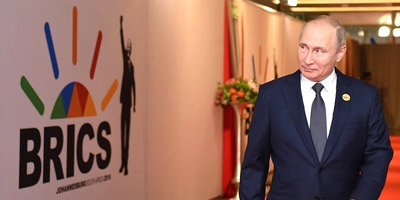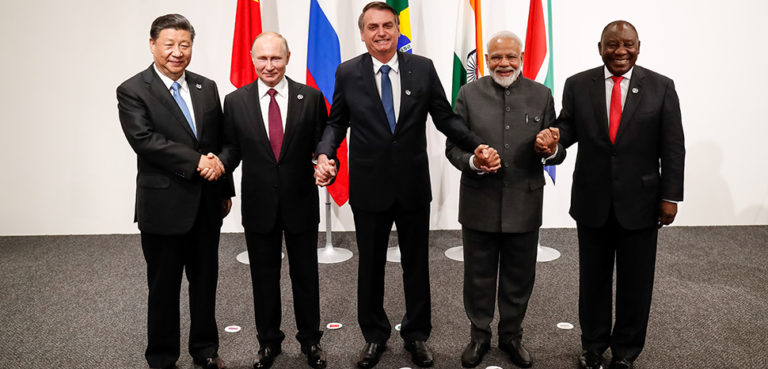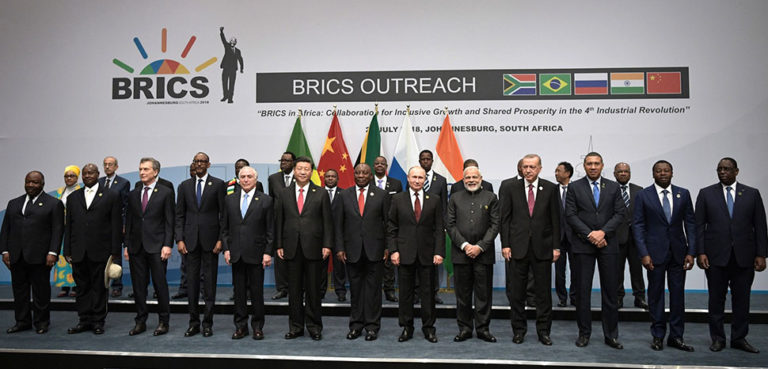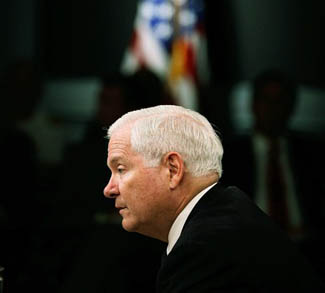The Munich Security Conference is a leading annual forum on international strategy and security. The theme of its recent instalment, The Great Puzzle: Who Will Pick up the Pieces? assesses the crisis in the global order. Its report asks: “Will the defenders of the post-1945 international order be successful in preserving its main elements and piecing at least some of them back together? Or will the world continue to move closer to, as former Russian Foreign Minister Igor Ivanov has warned, a ‘perfect storm’ as the cumulative effect of several crises happening simultaneously destroy the old international system before we have even begun to build a new one?”
This question is circumscribed by its limited and dialectical scope. It presents the international order as singularly dependent on Western states, ignoring the agency of others. It is, therefore, deeply flawed. Our world is significantly different from that of 70 years ago, an era which was comprehensively dominated by the West with the United States at its core. The West is and will increasingly become relatively weaker. Even if it wished to do so, it neither has the means, nor the ways, to preserve a dominant command over the globe. While power is shifting away, historic hubris and strategic reluctance preclude the West from recognizing and, therefore, consolidating the modern diffusion of power. Until all legitimate forces are acknowledged as pieces of the ‘Great Puzzle,’ the condition of global power will remain, as Italian dissident Antonio Gramsci said, an interregnum: “The crisis consists precisely in the fact that the old is dying and the new cannot be born.”
Instead of a fused order being born, the old masters of power are enforcing an enduring interregnum. The intertwined existence of the key states ensures that their pushing and pulling maintains a delicate inertia.
Chief among those unwilling to relinquish control is the United States. As the architect of the recent order, it remains the greatest power and the central agent in this inertial (dis)order. Its response to internal decay and loss of relative power, not a ‘perfect storm’ of external factors, has led the Trump administration to change its tactical means and ways towards maintaining its core national interests: continued pre-eminence and global leadership. It is necessary to perceive its tactical movements, not the noise around it, to discern the grand strategy of the United States in the 21st century. Trump has boldly commenced this new strategy: a shift from providing global security and ensuring open markets, pursuing singular global command over a multilateral order, to a brazen ‘America First’ policy, seeking unilateral control in a contest among others. Though its current, crude form is subject to pressure and its continuation post-Trump is unclear, the US cannot and will not sustain its role as global guarantor and guardian. It will revoke its benign approach in order to take care of itself, first; its internationalism is being replaced by nationalism. The US will pursue its assertive national interest by leveraging its dominance; exerting power in order to maintain it. It will use its influence over partners as strategic instruments for cooption. Its retreat from the Iranian Nuclear Deal and its reimposition of sanctions on Iran limits partners from pursuing independent agendas. Its pressure on the international mechanisms that it originally assembled, such as the World Trade Organization, keeps other states from drawing benefit where it does not reciprocally profit. This return to nationalism should not be contorted by propaganda as a crass, malign pursuit. An ideological approach conceals its strategic intent; an emotional approach subverts an appropriate response. Instead, these moves should be seen as real; the global power is rescinding its constitutional arm from the international order. It is returning the world to its normal order; for a state to be independent, it must claim power itself. Realpolitik has awoken from its slumber.
Europe must realize that these tactical shifts are not simply the moves of an erratic US president. Europe must be strategic. Yet, to be truly strategic it needs to be consolidated and autonomous. A true strategy only exists where independence is expressed, where territory and truth are commanded. Europe’s disintegration is the goal of Trump’s éminence grise Steve Bannon and his Movement. Europe’s reform towards a consolidated union is its greatest challenge. The 2016 European Union Global Strategy takes a considerable step, employing strategy towards its interests; it is the first programme to declare strategic autonomy as its objective.
To achieve this goal, the bloc must shed its ideological straightjacket and wake up to realpolitik.
German Foreign Minister Heiko Maas recently made a call for practical intervention. He invoked an “alliance of multilateralists… a network of partners who stand up together for the preservation and further development of the rules-based order.” First, the salvaging of the state-centered international arrangement is needed to prevent disorder and decay. A lateral network among independent states, based upon the core principles of the United Nations Charter presents a practical point of departure. Such an order critically recognizes the strategic autonomy of states; it accepts multiplicity and rejects a narrow ideological approach.
Such a network of partners currently exists in the BRICS. Though BRICS remains misperceived and poorly articulated, it has been consolidated as an intergovernmental regime, towards maintaining and reforming the global order. BRICS rhetorically performs and promotes the principles and norms of the United Nations Charter. It develops an alternative narrative towards steering international cooperation and exchange.
This articulation of the international order confronts hegemonic conceptions, asserting that no unilateral interpretation holds as absolute truth. By returning the state to the center of global power, it asserts that sovereign states are not circumscribed by each other but only by legitimate international law and order.
BRICS functions as multilateral cooperation, in relation to the UN, not the US. Its emphasis on the legitimate principles of the UN points to Western liberal democracy as being a singular version inside a diverse international system; Western states are pieces of a broader puzzle. By collectively claiming the legitimate space for states to be independent, BRICS disrupts hegemonic inertia; it seeks to transcend the interregnum, to claim its representative global influence and to reform global order according to its interests.
BRICS’ challenge to hegemony is not direct. Instead, its strategic communications return focus to the UN Charter, advancing its core principles: sovereign equality, peaceful coexistence and non-intervention.
BRICS states have gained immense power under the open, networked order. It employs principled sovereignty to salvage this system and advance non-ideological cooperation. Its cooperation among its dissimilar member states presents a partnership that respects difference and recognizes independence.
In closing her keynote address to the Munich Security Conference, German Chancellor Merkel warned of the disintegration of the global order. She stated that the ‘Great Puzzle’ comes down to one foundational matter: instead of going it alone, we must abide by the cooperative, win-win principles of multilateralism. Merkel’s promotion of the Chinese maxim of win-win relations represents a clear rebuke of US unilateralism and the concomitant decay of order.
Any attempt to deny the major states their respective place in global order will fail. Only an inclusive order can be stable; the picture only coheres when all the puzzle’s pieces are present. Order and not disorder is in the interest of the entire world. It is only by placing practical differences and not ideological uniformity first that global order can be sustained and reformed.
Kotzé recently completed his PhD at The Centre for Rhetoric Studies (University of Cape Town) on the subject of BRICS and its strategies of persuasion
The views expressed in this article are those of the authors alone and do not necessarily reflect those of Geopoliticalmonitor.com or any institutions with which the authors are associated.




